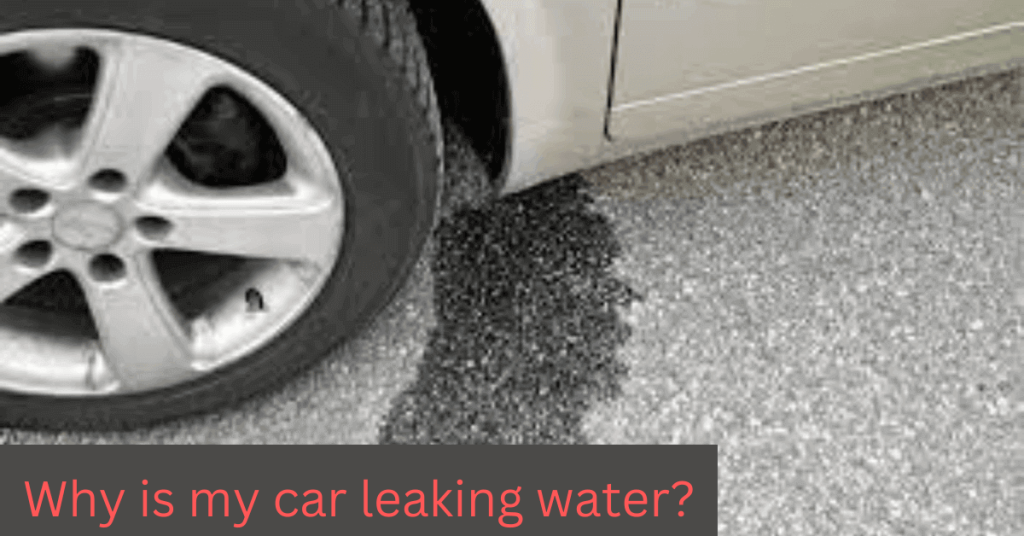
If you have ever noticed a water puddle under your car, or your car leaking water. Perhaps wondering exactly what it is, it is likely that you have a water leakage issue that requires maintenance. While a small amount of water is expected, a large puddle signifies a problem.
The car leaking water could be the result of several factors. For instance,
- A leak in the cooling system
- An Overfilled Header Tank
- A clogged sunroof drain
- A leak in the air conditioning system
- Issues with the windshield washer system
- And evaporator core.
Especially during the rainy season or even winter, ensuring your vehicle cabin is kept dry and comfortable is crucial before they lead to damp seats and flooring while on the road.
Here we’ll discuss the most common reasons for cars leaking water. So read on to know the details of why is your car leaking water.
Most Common Reasons Behind The Car Leaking Water: Explained
This guide aims to provide an overview of the most common causes of car leaking water. It is not exhaustive but covers the top reasons. Aside from learning how you can resolve the issue, you will also learn about the components that might be causing the issue.
Some solutions may involve inspecting your vehicle parts and replacing them as needed, while others may require the assistance of a professional mechanic or technician.
A leak in the cooling system
A leak in the cooling system can cause water to leak from a car in several ways. Radiators leak most commonly through holes or cracks. This can cause coolant (a mixture of water and antifreeze) to leak out and onto the ground.
Another common way a leak in the cooling system can cause water to leak is through a malfunctioning water pump. However, Coolant circulates through the engine through the water pump, and if it fails, coolant can leak.
Also, leaks in the hoses and gaskets that connect the various components of the cooling system can also cause coolant to leak and result in a car leaking water.
In order to solve the issue of a car leaking water because of a leak in the cooling system. The following steps can be helpful:
- Locate the source of the leak: Visually inspect the radiator, hoses, and gaskets for any visible signs of damage or leaks. Check the water pump for any leaks or signs of wear.
- Drain and flush the system: Drain the existing coolant from the system and flush it with clean water to remove any debris or contaminants that may have accumulated.
- Replace any damaged parts: If the radiator, hoses, gaskets, or water pump got damaged or worn, you should replace them. It is also recommended to replace any other parts that are showing signs of wear, such as the thermostat or the fan belt.
- Refill the system: Once you clean the system & replace all the necessary parts and refill it with fresh coolant according to the manufacturer’s recommendations.
- Test the system: Start the engine and let it run for a few minutes to check for leaks. If everything seems to be working properly, take the car for a test drive to ensure that the cooling system is functioning correctly.
An Overfilled Header Tank
An overfilled header tank, also known as the coolant recovery tank. However, this can cause water to leak from a car by overflowing. The header tank is also responsible for maintaining the correct coolant level in the radiator. Also, if it is overfilled, coolant can spill out of the overflow hose or overflow reservoir and onto the ground.
This can happen due to a malfunctioning coolant level sensor, an incorrect coolant level, or a malfunctioning radiator cap. However, that can’t hold the pressure of the system and release the coolant.
To solve the issue of a car leaking water because of an overfilled header tank, follow the following steps:
- Check the coolant level: Inspect the header tank and check the coolant level. If it is overfilled, remove some coolant to bring it to the correct level.
- Look into the radiator cap: Inspect the radiator cap for any signs of wear or damage, and make sure that it is properly sealed.
- See the coolant level sensor: If the coolant level sensor is malfunctioning, it may cause the header tank to overfill. Consult the vehicle manual to locate the coolant level sensor and test its functionality.
- Look into the hoses and gaskets: Inspect the hoses and gaskets that connect the radiator and the header tank for any signs of damage or leaks. Replace any damaged hoses or gaskets.
A clogged sunroof drain
A clogged sunroof drain can cause water to leak into a car indeed. This because the water is not able to flow through the drain and out of the car. Instead, the water may collect and overflow, causing leaks in the car’s interior.
This can happen if debris such as leaves, twigs, or dirt clogs the drain, preventing the water from flowing through. It can also happen if the drain tubes become disconnected or damaged. It causing water to leak into the car instead of flowing out.
There are several ways to solve a clogged sunroof drain that is causing water leaks in a car:
- Clear the debris: Use a small, flexible object such as a wire hanger or a pipe cleaner to clear any debris that may be blocking the drain. Be careful not to push the debris further into the drain, which can make the problem worse.
- Check the drain tubes: Make sure that the drain tubes are securely connected to the sunroof and that they are not damaged. If they are disconnected or damaged, they will need to be replaced.
- Inspect the sunroof seal: Check the seal around the sunroof to ensure that it is in good condition and not cracked or damaged. A damaged seal can allow water to leak into the car.
- Professional service: If you are unable to clear the clog or fix the problem yourself, it may be best to take the car to a professional mechanic or dealership for service.
A leak in the air conditioning system
A leak in the air conditioning system can cause water to leak into a car because the evaporator, which cools and dehumidifies the air inside the car, can cause condensation to form. This condensation then drips into a drain pan and out of the car.
If there’s a leak in the system, this water can instead leak into the car’s interior. This also can happen if the evaporator or one of the air conditioning’s hoses has a hole or tear that allows the refrigerant to leak out.
This can also cause a decrease in the cooling capacity of the system, and the humidity inside the car increases. Eventually, the water can cause damage to the car’s upholstery, electrical systems, or other components.
You can fix a leaky air conditioning system in your car in several ways:
- Locate the leak: The first step in solving a leak in the air conditioning system is to locate where the leak is coming from. You can do this by visually inspecting the system, using a UV dye and UV light, or performing a pressure test.
- Replace the leaking component: Once you locate the leak, the component that is leaking will need to be replaced. Choosing the right sealants and parts is essential for preventing leaks in the future.
- Evacuate and recharge the system: After replacing the leaking component, the refrigerant that leaked out will need to be evacuated from the system and replaced with fresh refrigerant. You can do this with the help of a professional mechanic or technician who has the necessary equipment.
- Regular maintenance: Checking the hoses and seals of your air conditioning system can reduce the likelihood of leaks in the future.
Issues with the windshield washer system
Issues with the windshield washer system can cause a car to leak water because the system uses water to clean the windshield. If there is a problem with the system, such as a clogged nozzle or a malfunctioning pump, the water may not be directed in good order and can leak.
This can happen if the washer fluid reservoir is overfilled, while this can cause pressure to build up and force water to leak out. Also, a cracked or damaged windshield washer fluid reservoir can allow water to leak into the car.
Also, if the washer nozzle is aimed in the wrong direction, the water may leak into the car’s interior through the door seals or other openings.
To solve this problem, you can:
- Check the washer nozzle: Make sure that the washer nozzle is aimed correctly and that it is not clogged with debris. Clean the nozzle if necessary.
- To check the washer pump: Make sure that the washer pump is working well.
- Check the washer fluid reservoir: Make sure that the reservoir is not overfilled, and that it is not cracked or damaged.
- Check the washer fluid level: Check the level of the washer fluid and refill it if necessary.
Issues with an Evaporator core
An evaporator core is a component of the car’s air conditioning system. That is responsible for cooling and dehumidifying the air inside the car. It also can cause a car to leak water if it becomes clogged or damaged.
When the evaporator core becomes clogged with debris or mould, the condensation that forms on it can’t flow properly to the drain pan, and instead, the water may leak into the car’s interior.
Also, if the evaporator core develops a crack or hole, the refrigerant from the air conditioning system can leak out and cause the water from the condensation to leak into the vehicle.
To solve this problem, you can:
- Inspection: Inspect the evaporator core to see if it’s clogged or damaged, If it appears to be clogged, you need to clean it.
- Replace the evaporator core: If the evaporator core is damaged, you’ll need to replace it.
- Evacuate and recharge the system: After replacing the evaporator core, the refrigerant that leaked out should be evacuated from the system and replaced with fresh refrigerant.
Final Thought
If you can’t locate or fix the problem of the car leaking water indeed. It may be best to take it to a mechanic or dealership indeed. Furthermore, regular maintenance of the vehicle, including checking its systems. They can prevent the car from leaking water in the first place.
Keep Reading Why Is My Jeep Wrangler Leaking Oil? Reasons Explained!
FAQs
Why isn’t my car overheating but leaking water?
You most likely have an external coolant leak, an interior coolant leak, or a radiator cap leak indeed. However, the expense of repairing a coolant leak will increase the longer you wait. Find out how to identify an antifreeze leak and what to do after that.
How can I tell if my air conditioner’s coolant is leaking?
A technician can use UV dye to find a refrigerant leak indeed. In order to locate the leak’s source, an HVAC specialist will run a fluorescent dye through your system. A detecting lamp is then used to pinpoint the leak’s precise position after it has circulated throughout your HVAC system.
Is a coolant leak a severe issue?
Although coolant leaks may not appear serious, they could put the engine of your car in danger. However, your engine could overheat if the right amount of antifreeze isn’t used. The coolant needs to be checked frequently because it is so important for how well your engine runs.
How much does it cost to repair a coolant leak?
If you do so, you’ll be able to keep expenses low and just spend the $50. So it should cost for fresh coolant. Further, depending on the type and model of your car, the cost to have it fixed. However, a mechanic cahrge is $90. However, replacing a car radiator might cost anywhere between $300 and $900.
Can I replace the coolant with water?
In addition to allowing you to drive the automobile for a brief period, water does not adequately protect the engine. However, this indicates that the issue that led to a low coolant level must be resolved right away. Also, the radiator must be filled with a 50/50 mixture of coolant and water.









Leave a Reply